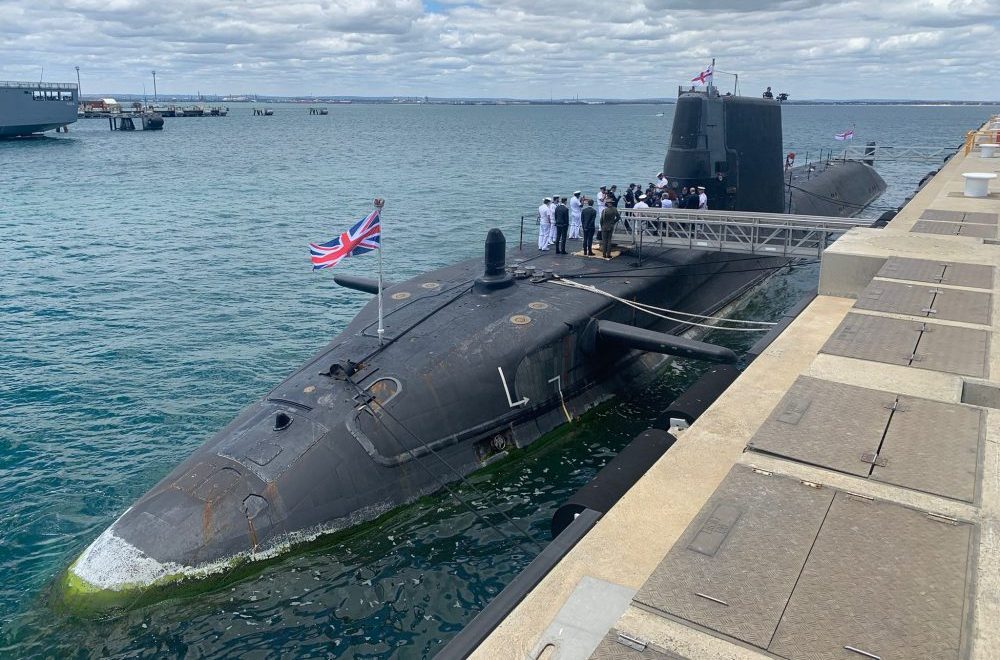
Perhaps my ticklish British sensibilities are getting the better of me, but I’ve noticed a creeping tendency in the Australian debate to reduce the United Kingdom’s role in AUKUS to the margins of what is meant to be a tripartite arrangement among equals. Two weeks after the 16 September announcement, The Australian’s Greg Sheridan wrote: ‘It is impossible to understand why the Brits are in the mix, apart from PR.’ Stephan Frühling’s thoughtful contribution on AUKUS for The Strategist was illuminating on the US alliance dynamics, but also notable for its parenthetical ‘(and UK)’ formulation. Others have followed suit.
Now, commentary from across the pond has got in on the act, relegating the UK role to the margins. ASPI boss Peter Jennings, well known as a devotee of the Anglosphere, wrote recently on the submarine selection, ‘Australia should opt to buy into the US Virginia-class production line; we need to find a way to bring the UK into that.’ Even if that were possible, it’s not clear what it would mean practically for the UK beyond token inputs, given that the Virginia class is a mature US design based on a US combat system and US reactor.
Those focused on the cyber, artificial intelligence and quantum aspects of AUKUS tend to give more weight to the UK role, interestingly. There’s something about the submarine choice that predisposes Australian observers to see an ANZUS cookie in an AUKUS biscuit wrapper, even among the critics. Several influential commentators, some now in government, have made no secret of their longstanding preference for the Virginia class to meet Australia’s future submarine requirement.
Granted, the void of official detail for such a prominent initiative has been a license to speculate. My initial take on AUKUS underplayed the UK role, branding Australia’s future submarine capability as a ‘ward’ of the ANZUS alliance. Only later did it emerge that the spark for AUKUS was a bilateral approach from Australia’s chief of navy to his British counterpart. The Brits then played a significant behind-the-scenes role by fleshing out the AUKUS agenda into a broader strategic technology-sharing framework, enlarging it beyond the original focus on undersea warfare. The Royal Navy has literally pushed the boat out by promptly getting HMS Astute alongside for an inspection at HMAS Stirling.
My point is not that the Astute design has any inherent advantage over the Virginia, or that the non-submarine aspects to AUKUS lack substance. It is Australia’s sovereign decision to make and Australian taxpayers’ money to spend at the end of the day. If Canberra opts for a US submarine, the UK will respect that without histrionics, I suspect. But it helps to remember that Australia first approached the UK—just as it is still remembered in Tokyo that former prime minister Tony Abbott knocked on his Japanese counterpart Shinzo Abe’s door to sound him out about submarine opportunities.
There’s more to this than diplomatic nicety. The UK isn’t in AUKUS as a makeweight or annex to the ANZUS alliance, but because its interests are tied to the Indo-Pacific. An isosceles triangle is not equilateral, but it is still a triangle. The value of the UK to Australia, as the smallest of the three AUKUS partners by some margin, is that it adds subtle leverage vis-à-vis Washington, potentially bidding up Canberra’s access to strategic technology, while providing political insurance against the potential for American capriciousness in future, since even a second Trump administration may blanch before burning its two closest alliance bridges. That’s clever diplomacy on Canberra’s part, but London is not a stepping stone to Washington and should not be treated as such.
AUKUS, to be clear, is a welcome, stabilising development for regional security, as Philippines Foreign Minister Teodoro Locsin’s statement graciously and eloquently expressed. But it is an act of strategic desperation on Australia’s part, nonetheless. Desperation for submarine capability doesn’t bring out the best in Australia’s strategic personality. For sure, France’s reaction to the cancellation of the Attack-class deal has been out of all proportion, just as Japan’s disappointment in 2016 was understated. Australia must resist the impatient urge to step over anyone that gets in the way of a capability that is still the better part of two decades out of reach. Here-and-now relationships matter too.
And AUKUS represents a stripping down of Australia’s security partnerships to their bare nucleus. Like any nuclear core, it needs handling with care. Another point, specific to the UK, is that familiarity can sometimes breed contempt. Add in a dash of desperation and the resulting brew could curdle. Australia is diplomatically alive to the sensitivities AUKUS provokes in Southeast Asia, and with good reason. But AUKUS has feelings too.
Sheridan’s latest suggests that new joint AUKUS announcements are pending. That will hopefully put some meat on the arrangement’s skeleton, providing the basis for a more structured debate. He has also sharply changed his tune on the UK’s involvement, predicting that ‘whichever boat is chosen, both the US and Britain will be involved in the project and make money from it’. Perhaps it will also allow the UK to cast off its parentheses in Australia’s AUKUS debate.

